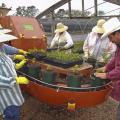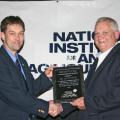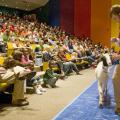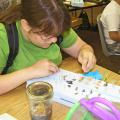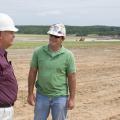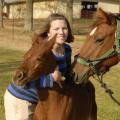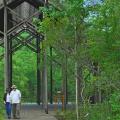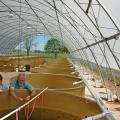Feature Story from 2009
By Karen Templeton
MSU Ag Communications
MISSISSIPPI STATE – A new Mississippi State University study shows that when it comes to horticulture, the right combination of machinery and human laborers can cultivate positive results for this growing industry.
MISSISSIPPI STATE – Exposed, termites are small and defenseless, but hidden and in high numbers, these insects can destroy a house from the inside out, causing homeowners untold expense and grief.
Blake Layton, an entomologist with Mississippi State University’s Extension Service, said termites are a dangerous threat to homes.
MISSISSIPPI STATE -- Dr. Lanny Pace, executive director of the Mississippi Veterinary Diagnostic and Research Laboratory System, was presented the National Institute for Animal Agriculture’s President’s Award at the annual meeting March 31 in Louisville, Ky.
The President’s Award is given to an NIAA committee chairman in recognition of exemplary leadership and dedication to the Institute. Pace heads NIAA’s Emerging Disease Committee.
By Karen Templeton
MSU Ag Communications
MISSISSIPPI STATE – Mississippi State University veterinary students learn in the classroom and in the laboratory, but the real test comes when they add in the responsibility of staging the spring open house and teaching the public about animal care and welfare.
For more than two decades, MSU’s College of Veterinary Medicine has welcomed children and families to its annual open house. This year, the April 3-4 event was attended by 3,800 visitors.
By Patti Drapala
MSU Ag Communications
MISSISSIPPI STATE -- It is no secret that many ants live beneath the leaves, bark and soil of the Noxubee National Wildlife Refuge, but no one knew how diverse the population was until Mississippi State University entomologists dug up the facts.
By Patti Drapala
MSU Ag Communications
MISSISSIPPI STATE -- Spiders may have webs, but the ants of the Southeast have something that lasts a little longer than spun silk – their own Web page.
Joe MacGown, ant curator of the Mississippi Entomological Museum at Mississippi State University, built the page to make information easily available on different ant species found in southeastern states.
MISSISSIPPI STATE – The 8th annual Catch the Vision benefit to help fund outdoor adventures for children with life-threatening and terminal illnesses promises sponsorship packages to fit every budget and fun for all who participate.
This year’s event will include the Shotgun Jamboree and banquet dinner on May 16. The funds raised at the events go directly to the Catch-A-Dream Foundation, housed at Mississippi State University. The foundation provides outdoor adventure trips for children with life-threatening conditions.
MISSISSIPPI STATE – Explorers ages 10 and up who want to learn more about the relationship between insects and plants should plan to attend Mississippi State University’s annual 4-H Entomology and Horticulture Camp this summer.
This year’s camp is June 14-18 at MSU. Hosting the event are the Department of Entomology and Plant Pathology, the Department of Wildlife and Fisheries, and the Noxubee National Wildlife Refuge.
By Karen Templeton
MSU Ag Communications
MISSISSIPPI STATE – An interactive learning program administered by Mississippi State University helps children get inside the human body and understand that lifestyle choices made at early ages have a direct impact on adult health.
Sponsored by MSU’s Extension Service, 4-H and Blue Cross/Blue Shield, Body Walk is a free, traveling exhibit of the human body with 10 interactive learning stations. Each station teaches children in a fun way about the human body and how to make healthy choices.
MISSISSIPPI STATE -- The so-called swine flu has not been detected in any U.S. hogs, and no Mississippians have been diagnosed in the initial cases, but the outbreak signals the need for continued health precautions even as seasonal flu cases subside.
Dr. Bill Epperson, head of pathobiology and population medicine with Mississippi State University’s College of Veterinary Medicine, said this new strain of the classic H1N1 virus is misnamed when referred to as swine flu.
MISSISSIPPI STATE – A May 7 workshop is designed to help current and potential fruit and vegetable growers and farmers’ market managers boost profits.
There are 54 active farmers’ markets in the state and more are started each year. These have become more popular as customers understand the benefits of buying fresh, locally grown produce.
MISSISSIPPI STATE -- Mississippi State University’s Division of Agriculture, Forestry and Veterinary Medicine recognized three graduates as the latest Alumni Fellows inductees.
The newest College of Forest Resources Alumni Fellow is James Earl Kennamer of Edgefield, S.C. Kennamer is the senior vice president of conservation programs for the National Wild Turkey Association. Kennamer received his master’s degree in wildlife management in 1967 and a doctorate in wildlife management in 1970.
By Karen Templeton
MSU Ag Communications
MISSISSIPPI STATE – Cattle and dairy producers stand to benefit from cutting-edge genetic research conducted by scientists around the world and at Mississippi State University.
More than 300 scientists from 25 countries formed a consortium to fully map the bovine genome. The study, partially funded by Mississippi’s Agricultural and Forestry Experiment Station, was conducted over six years and has proven successful as researchers developed a blueprint of the bovine’s DNA.
MISSISSIPPI STATE – It has been decades since surface coal mines left land scarred and bare, and expertise from Mississippi State University is helping the lignite mine in Choctaw County leave the land in even better shape than it was before.
MISSISSIPPI STATE – Wild hogs make pigs of themselves when rooting through crops and young forests, leaving behind a wide swath of damage and economic loss.
Producers and wildlife managers who deal with this problem can get help by attending a wild hog workshop sponsored by the Mississippi State University Extension Service; the Mississippi Department of Wildlife, Fisheries and Parks; and the Mississippi USDA Wildlife Service.
MISSISSIPPI STATE – Mississippi State University’s Extension Service and WTVA-TV have joined together to educate the public about the much-anticipated digital television, or DTV, transfer.
MSU and WTVA-TV will present “Television Going Digital” through a free teleconference at 10 a.m. May 14 at all MSU Extension offices within the WTVA viewing area. WTVA’s director of engineering Wendell Robinson and evening news anchor Terry Smith will host the conference and provide attendees with information on how to prepare for the DTV transfer.
MISSISSIPPI STATE – Equine veterinarians at Mississippi State University feel like celebrating when they hear news about Freddie Mac and Fannie Mae.
Instead of gloom-and-doom news from Wall Street, they think about the healthy twin products of a champion cutting horse named Cal Senorita.
Cal has been a broodmare with MSU since 2000 after being sidelined with a career-ending leg injury. This beautiful, 15-year-old, sorrel quarter horse mare proved to be a champion again this spring by producing twins just days apart with the help of two surrogate mothers.
By Karen Templeton
MSU Ag Communications
MISSISSIPPI STATE – What was once a Depression-era strawberry farm now provides protection to some of the Southeast’s most diverse but disappearing habitats.
The Crosby Arboretum, located in Picayune, was established in 1980 as a living memorial to timber pioneer and philanthropist L.O. Crosby Jr. It is part of Mississippi State University’s Coastal Research and Extension Center and provides protection to the native plant species of the Pearl River Drainage Basin of south-central Mississippi and Louisiana.
MISSISSIPPI STATE – Two days in June are dedicated to educating those in the dairy industry about key issues in a time when producers are struggling to maintain profitability.
By Patti Drapala
MSU Ag Communications
MISSISSIPPI STATE -- Aquatic researchers at Mississippi State University study the natural mechanisms at work in lake ecosystems so they can find better ways to manage habitats, but large bodies of water do not always make good laboratories.
Pages
Feature Story Archive
- 2024 (111)
- 2023 (114)
- 2022 (116)
- 2021 (105)
- 2020 (141)
- 2019 (127)
- 2018 (141)
- 2017 (199)
- 2016 (242)
- 2015 (320)
- 2014 (358)
- 2013 (374)
- 2012 (344)
- 2011 (248)
- 2010 (239)
- 2009 (229)
- 2008 (189)
- 2007 (210)
- 2006 (199)
- 2005 (224)
- 2004 (218)
- 2003 (228)
- 2002 (177)
- 2001 (184)
- 2000 (190)
- 1999 (182)
- 1998 (179)
- 1997 (188)
- 1996 (58)
- 1995 (36)

